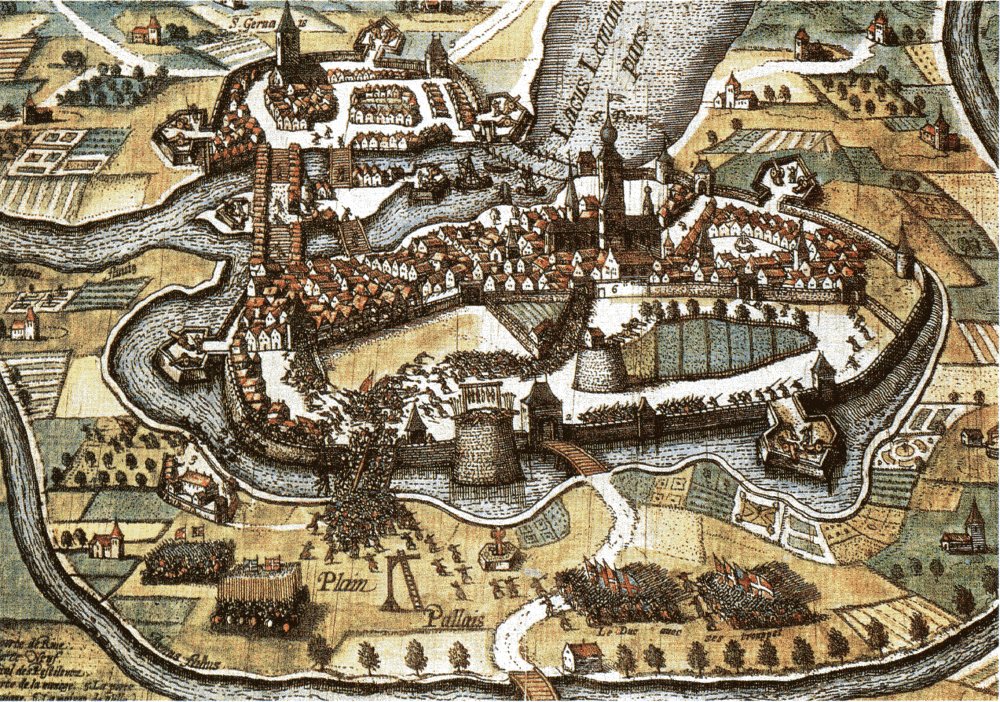- L'Escalade
Infobox Holiday
holiday_name = Fête de l'Escalade
type =
longtype =
caption = L'Escalade celebrating the defeat of the surprise attack by troops sent by Charles Emmanuel I, Duke of Savoy
observedby =Geneva ,Switzerland
begins =
ends =
date =
date2007 =7 December to9 December
date2008 =12 December to14 December
celebrations =
observances =
relatedto =L'Escalade, or "Fête de l'Escalade" (from
escalade , the act of scaling defensive walls) is an annual festival held in December inGeneva ,Switzerland , celebrating the defeat of the surprise attack by troops sent byCharles Emmanuel I, Duke of Savoy during the night of 11–12 December 1602. The celebrations and other commemorative activities are usually held on11 December or the closest weekend.Background
For years, the duke coveted the wealth of the city-state, which was not a member of the Swiss Confederation. When Charles Emmanuel came to the throne of the
House of Savoy in 1580, he longed to make Geneva his capital north of the Alps and crush Protestantism.Pope Clement VIII offered encouragement; in 1602 he appointed as Catholic bishop of GenevaFrancis de Sales , an effective preacher who had recently been successful in re-Catholicizing theChablais district ofSavoy on the south side of Lake Geneva.Attack
On
December 11 andDecember 12 (old style )1602 — the longest night of the year — the forces of the Duke of Savoy, under the command of the seigneur d'Albigny, and those of Charles Emmanuel's brother-in-law,Philip III of Spain , launched an attack on the city-state of Geneva. The troops marched along theArve River at night and assembled at Plainpalais, just outside the walls of Geneva, at 2 o'clock in the morning. The original plan was to send in a group of commandos to open the gate door and let the other troops in. The Geneva citizens defeated the men by preventing them from scaling the wall (climb in French is "escalade"). The night guard Jacques Mercier raised the alarm, church bells were rung, and the Genevois were alerted. The populace fought alongside their town militia. The duke's 2000-plus mercenaries were beaten. The Genevois lost 18 men in the fighting; the Savoyards suffered 54 fatalities and the troops had to retreat. Thirteen invaders who had been taken prisoner, including several well-born gentlemen, were summarily hanged the following day as thieves, since they could not be treated as prisoners of war, peace having been repeatedly sworn on the part of Savoy [http://www.compagniede1602.ch/histo/escalade.htm Compagnie de 1602] .] .According to Genevois legend, Catherine Cheynel, originally from Lyons and the wife of Pierre Royaume, ("Mère Royaume"), a mother of 14 children, seized a large cauldron of hot soup and poured it on the attackers. The Royaume family lived just above the La Monnaie town gate. The heavy cauldron of boiling soup landed on the head of a Savoyard attacker, killing him. The commotion that this caused also helped to rouse the townsfolk to defend the city.
After the defeat, the Duke of Savoy was obliged to accept a lasting peace, sealed by the
Treaty of St. Julien ofJuly 12 ,1603 .The story of L'Escalade is told in a song called
Cé qu'è l'ainô , written in a Franco-Provençal dialect around 1603 by an unknown author. The song has become the "national"anthem of Geneva; while the complete version comprises 68 stanzas, only four of them are usually sung.It was also celebrated in verse by
Samuel Chappuzeau in his "Genève Délivrée", the manuscript of which was presented to Geneva after his death in 1701.Celebration
Although the armed conflict actually took place after midnight, in the early morning on
December 12 , celebrations and other commemorative activities are usually held onDecember 11 or the closest weekend. Celebrations include a large marmite (cauldron) made of chocolate filled withmarzipan vegetables and candies wrapped in the Geneva colours of red and gold. It's customary for the eldest and youngest in the room to smash the marmite, while reciting, "Ainsi périssent les ennemis de la République!" " (Thus perish the enemies of the Republic). Other traditions includemulled wine , a large serving of soup, and children in Halloween-like costumes singing Escalade songs for money. It is also common for children in school to prepare vegetable soup, which is served to parents and families that night. There is also a parade on Sunday evening. The names of the eighteen who died—Jacques Billon finally died of his wounds a year later—are called out, one after another. Since 1978 there has been another element to the celebration of the Escalade, with aroad running event being held the weekend preceding the night of the 11th. The run traditionally starts in the "parc des Bastions" and goes through the Old City of Geneva, before finishing near the start again. It is one of the most significant annual events in Geneva, and is one of the most prestigious sporting events in Switzerland.External links
* [http://www.compagniede1602.ch/ Compagnie de 1602] , the group who organises the yearly festival.
* [http://www.escalade.ch/ La Course de l'Escalade] .
* [http://www.zum.de/whkmla/military/17cen/geneva1602.html World History at KMLA: The Savoyard attack on Geneva] .
* [http://www.cosmopolis.ch/english/cosmo43/fete_de_l_escalade.htm Fête de l'Escalade] : a yearly celebration in Geneva in memory of the night attack by the Savoyards in 1602.References
Wikimedia Foundation. 2010.
